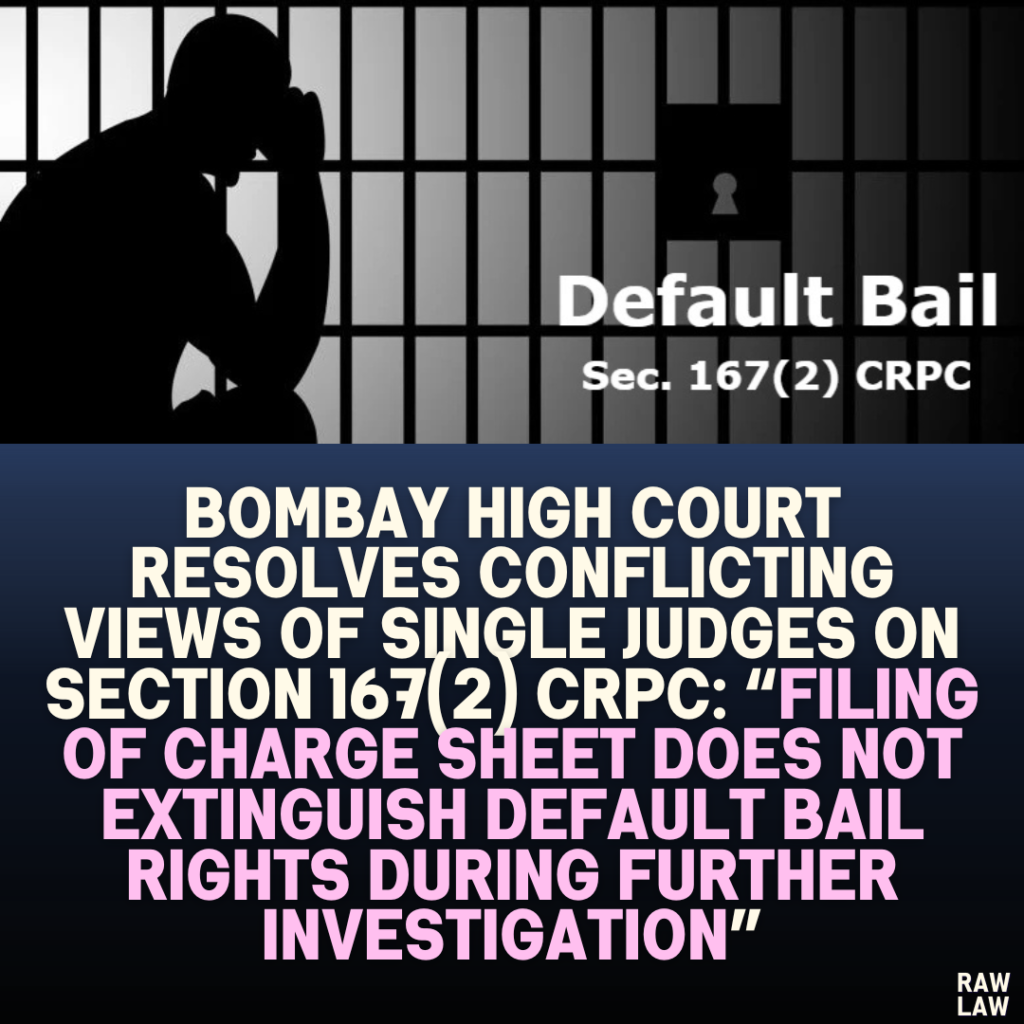Court’s Decision: The Bombay High Court, resolving the conflicting views of its Single Judges on the applicability of Section 167(2) of the Code of Criminal Procedure (CrPC), held that the filing of a charge sheet does not extinguish the accused’s right to default bail if subsequent investigation leads to further arrest and detention. The court emphasized that this interpretation aligns with the constitutional safeguards under Article 21 of the Constitution.
Facts:
- The petitioner, accused of multiple offenses under the Indian Penal Code, Arms Act, Maharashtra Police Act, and Maharashtra Control of Organized Crime Act (MCOCA), was shown as absconding in a charge sheet filed on September 15, 2018.
- He was arrested on August 28, 2021, and subsequently, a supplementary charge sheet was filed against him.
- The petitioner moved for default bail under Section 167(2) CrPC, arguing the delay in filing the supplementary charge sheet violated his rights.
Issues:
- Whether Section 167(2) of CrPC applies to accused persons arrested during further investigation after the filing of an initial charge sheet.
- Whether the detention under such circumstances is governed by Section 309(2) or Section 167(2) CrPC.
Petitioner’s Arguments:
- The petitioner’s counsel argued that the detention violated his fundamental rights under Article 21 and that he was entitled to default bail due to the prosecution’s failure to complete the investigation within the prescribed time.
- They emphasized the constitutional commitment to life and liberty, advocating a liberal interpretation of Section 167(2) CrPC.
Respondent’s Arguments:
- The prosecution argued that the petitioner was absconding at the time of the initial investigation, and his subsequent arrest allowed further investigation.
- They contended that the provisions of Section 167(2) CrPC do not apply post-cognizance when supplementary investigations are ongoing.
Analysis of the Law:
- Section 167(2) CrPC: The court reiterated that the provision is a legislative safeguard of Article 21 rights, emphasizing the accused’s right to default bail if the investigation is not completed within the prescribed period.
- Section 309(2) CrPC: The court clarified that this provision governs remand after cognizance but does not preclude the applicability of Section 167(2) for those arrested during further investigation.
- Supreme Court Precedents:
- M. Ravindran v. DRI: Highlighted the intrinsic link between default bail and Article 21.
- State through CBI v. Dawood Ibrahim Kaskar: Distinguished between remand under Sections 167 and 309 CrPC during further investigations.
- Pradeep Ram v. State of Jharkhand: Reaffirmed that an accused arrested during further investigation is entitled to default bail under Section 167(2).
Precedent Analysis:
- The court extensively reviewed the conflicting decisions of Single Judges in Pankaj v. State of Maharashtra and Anil Nagpal v. State of Maharashtra.
- It endorsed the view in Pankaj, aligning it with constitutional principles and Supreme Court precedents, while rejecting the interpretation in Anil Nagpal as inconsistent with the legislative intent of Section 167(2) CrPC.
Court’s Reasoning: The court emphasized that:
- The legislative intent behind Section 167(2) CrPC is to ensure the expeditious completion of investigations while safeguarding the rights of the accused.
- Allowing default bail promotes accountability in the investigative process and prevents arbitrary detention.
Conclusion: The High Court upheld the petitioner’s right to default bail under Section 167(2) CrPC, emphasizing that this right remains intact even during further investigations after the filing of an initial charge sheet. It directed the appropriate relief to the petitioner in line with the constitutional commitment to life and liberty.




Pingback: Supreme Court Clarifies Liability Under Section 138 of the NI Act: "Director Cannot Be Held Liable Without the Company Being Made an Accused" - Raw Law
Pingback: Supreme Court Upholds Conviction for Rash and Negligent Driving: “Sympathy Cannot Override Justice in Cases Involving Loss of Life,” Reaffirms Accountability Under Sections 304A and 279 IPC - Raw Law